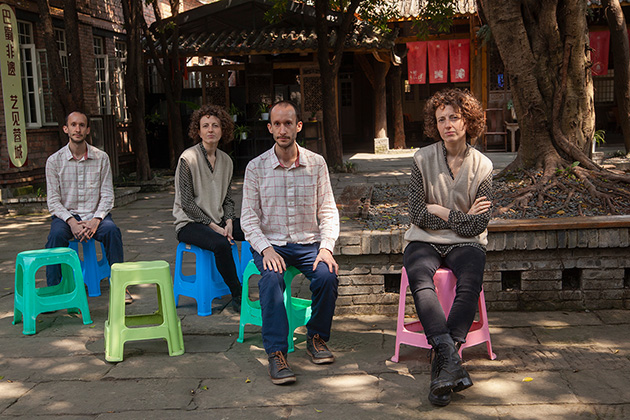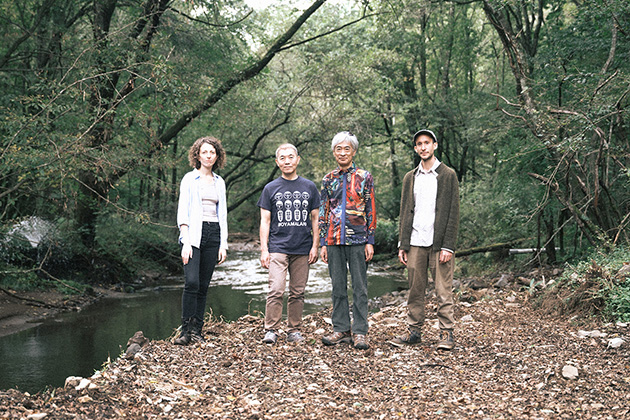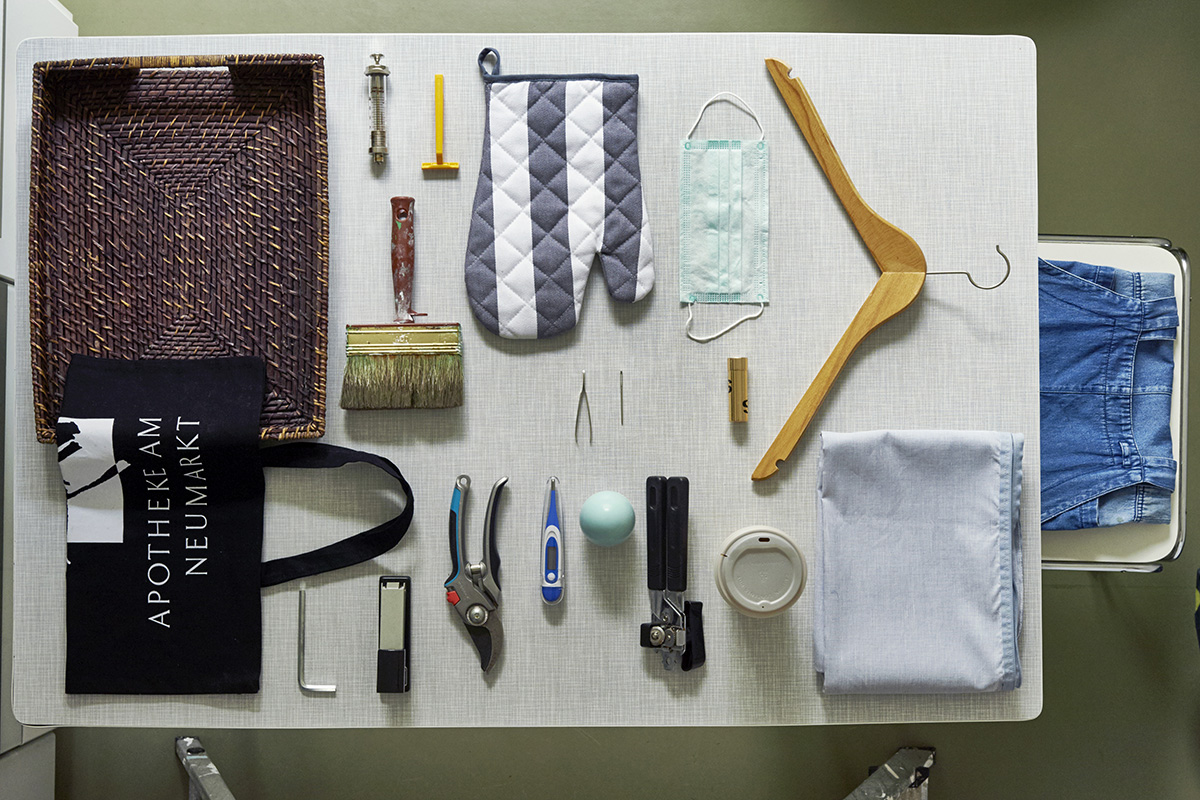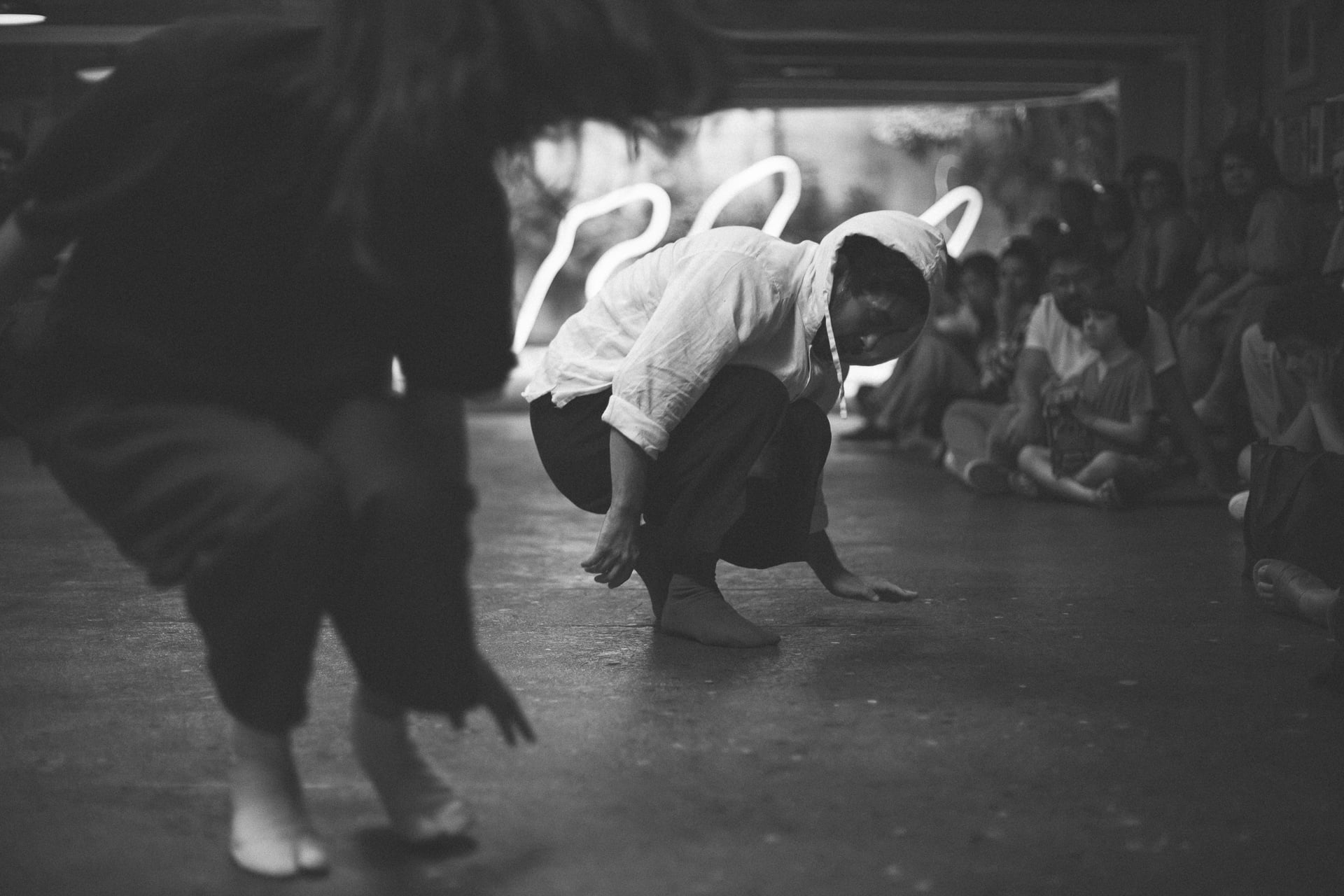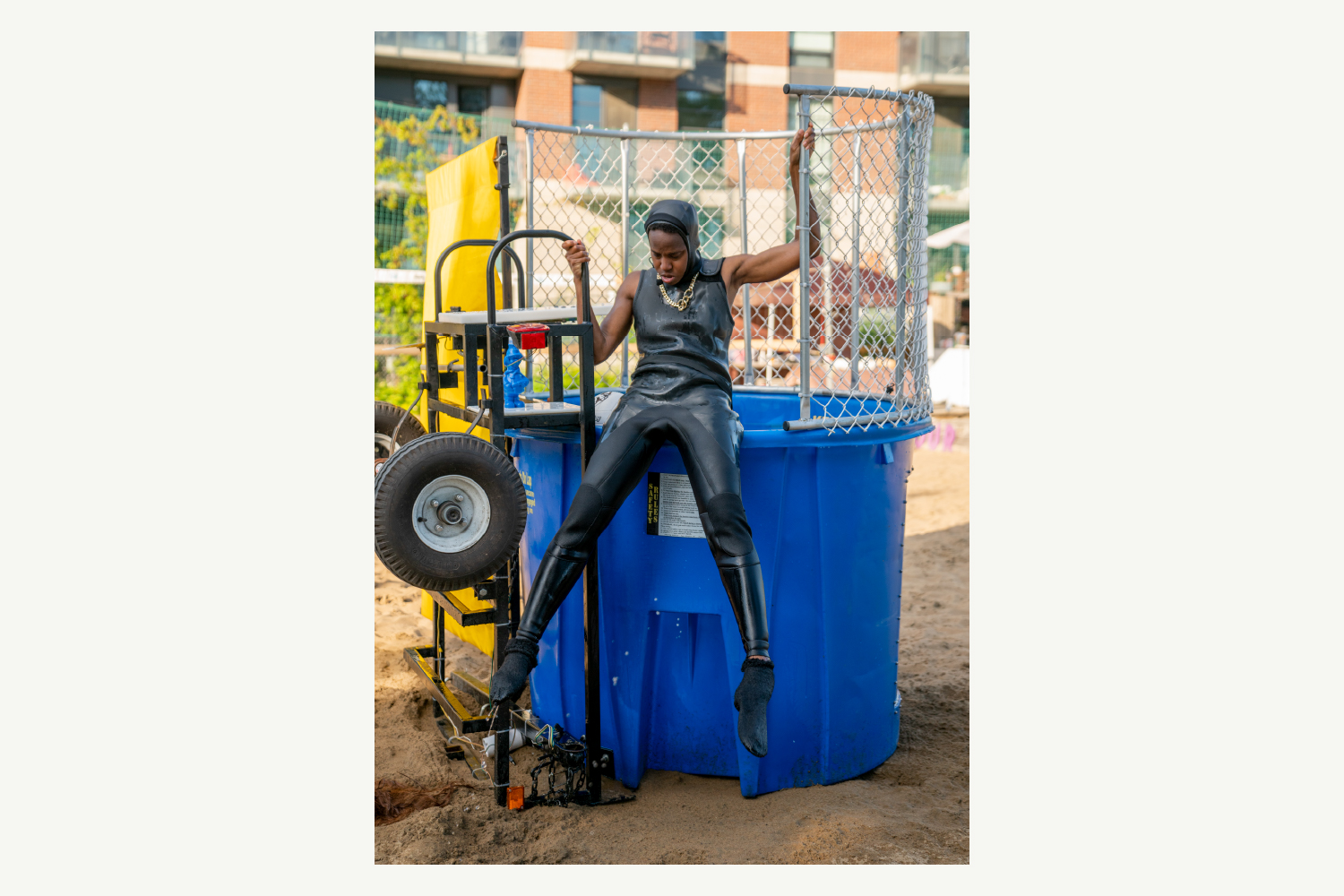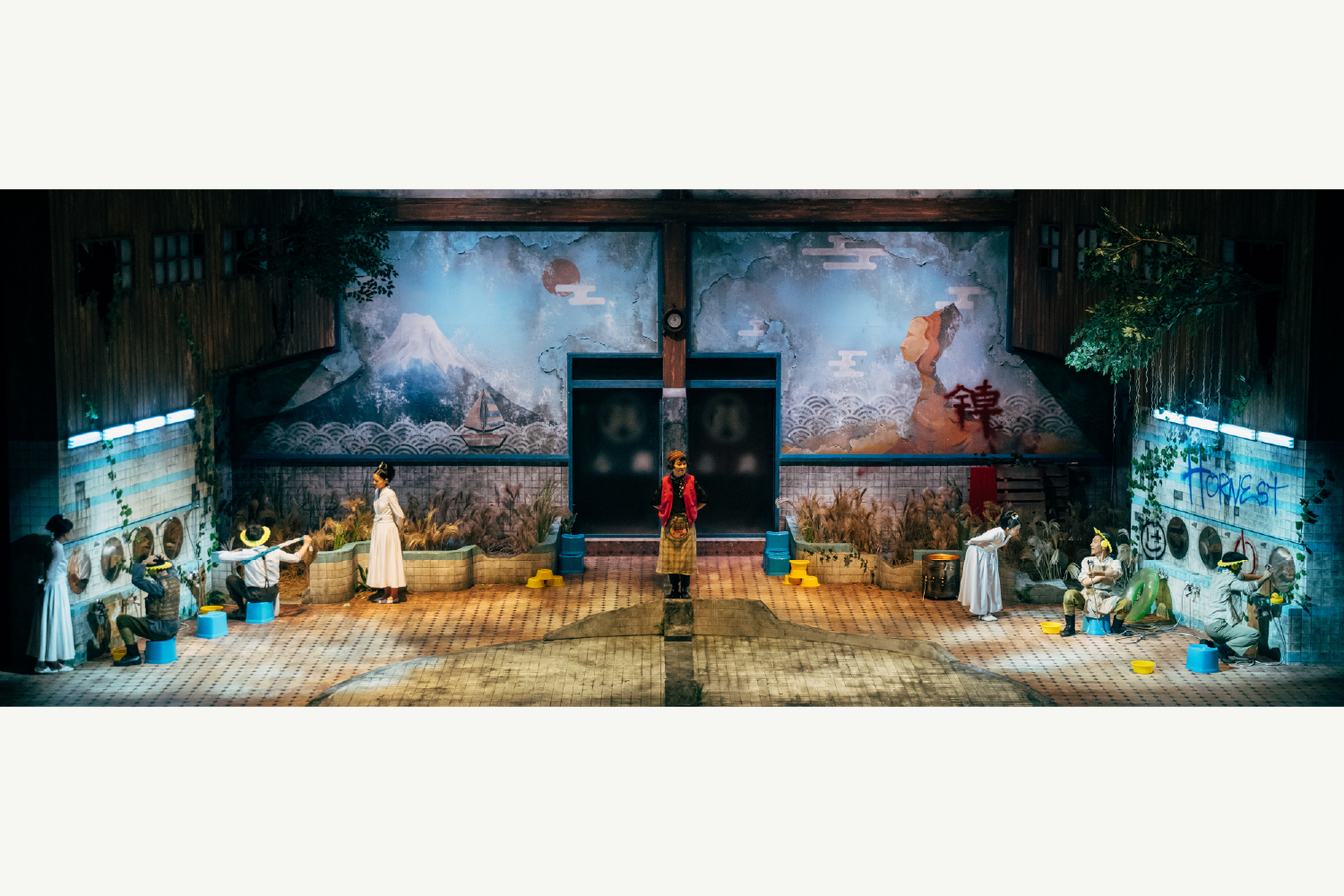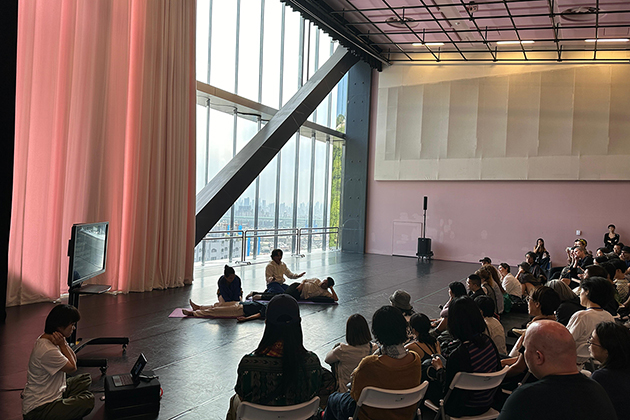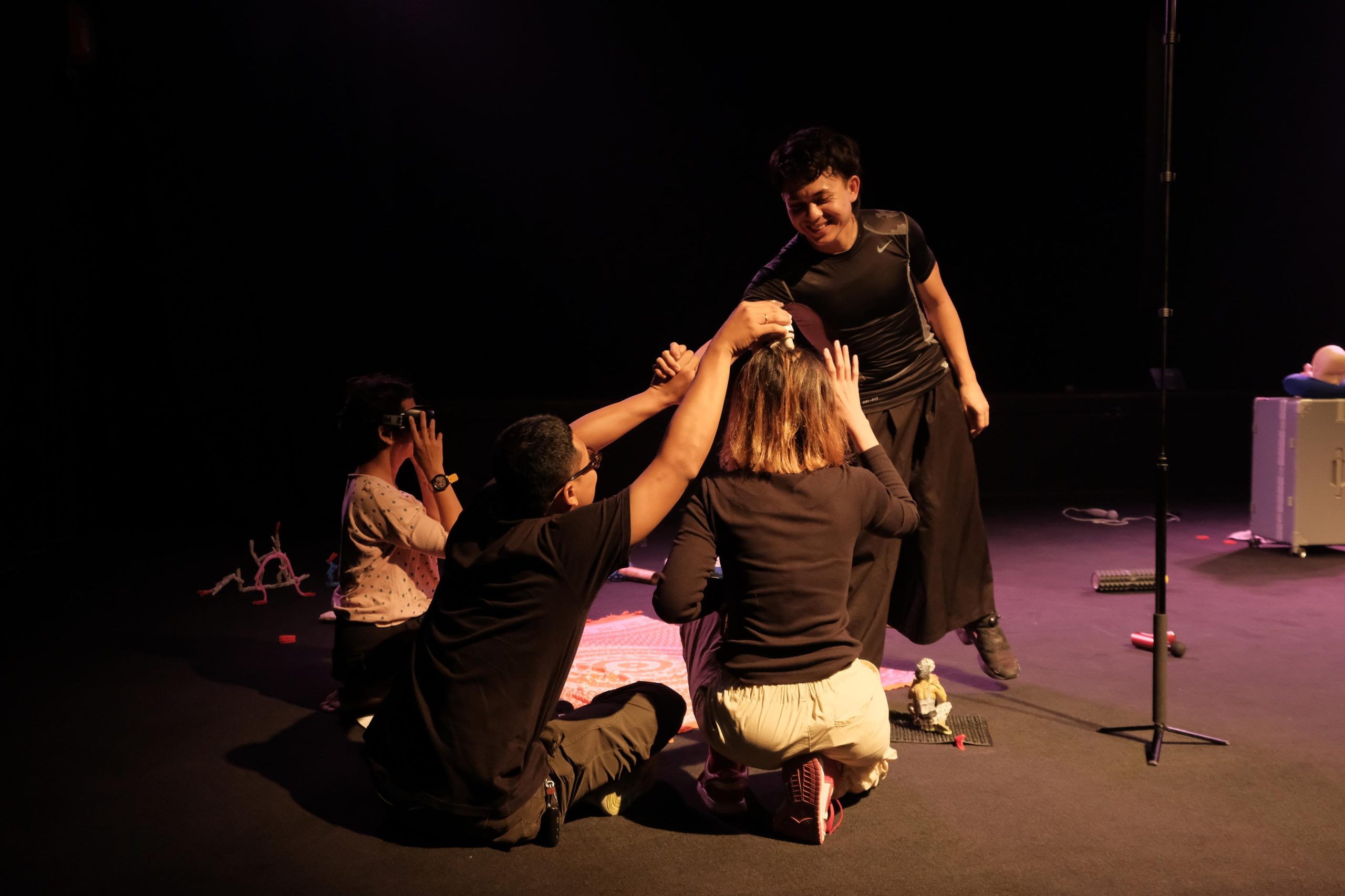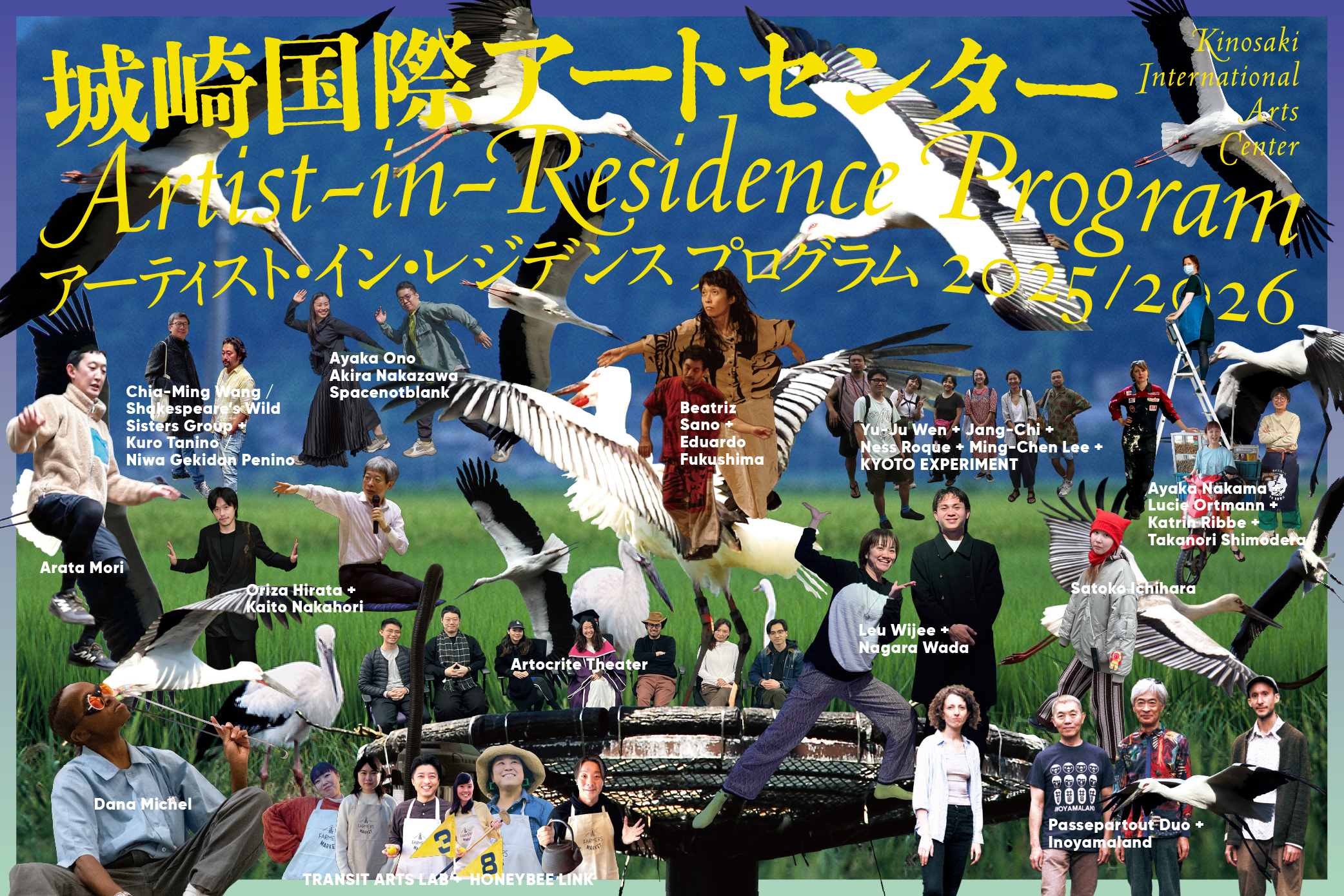ARTICLES

©igaki photo studio
At Kinosaki 2019
Satoko Ichihara
2020.2.13
I stayed at Kinosaki International Arts Center for about a month, for the creation of The Bacchae − Holstein Milk Cows, which was premiered in the performing arts program of Aichi Triennale 2019.
Based on the tragedy of The Bacchae by Euripides, this musical work borrows the form of Greek theater. Other than the main actors, I featured the “khoros (Greek chorus)” group for singing and dancing; and all the performers were female. Back in the ancient Greece, participation in the theater as a public project was the responsibility and the right for a “citizen”. The “citizen” meant only adult males, thus, only men were the performers. The position of women in the society was still considered too low to be “citizen”. The Aichi Triennale has set up the gender equality as one of its themes, even though it is not too obvious now due to the various controversies concerning the event. In fact, not only in the ancient Greek times, but in the present society, there are numerous unequal circumstances because of the gender. Certainly, the gender exists in a gradational scale. On the other hand, the social condition at this moment is at its extreme. And at times, it is necessary to find some closures or state things firmly, in order to go on. That was the reason I chose to work only with women, simply reversing the conventional composition of the Greek tragedy. During the residency at Kinosaki International Arts Center, besides writing the texts and rehearsing with performers, I also held workshops where I had the local citizens sing the chorus that I use in the play. Following the traditional Greek play, I had planned to appoint a chorus of 12 members; however, in these past years, I have only worked with two or three performers for a work and never created a work with 10 or more performers. So I wanted to see how it was like, and I asked for women only to participate in the workshops as well, not only because I wanted to have a simulation, but also because I evaluated what would be the best way to meet with my text, for the local people who are not familiar with my work yet. I write about the fundamental sex and life in my play, through the description of the sex of human as an animal or the mating between the different species. Thus, the text is strongly influenced by the fact that I, the author, have female mentality and body. Too extreme and radical, some say. I want the local citizens to be as relaxed and honest as possible when they meet my play. The pressure caused by the gender difference can never be eliminated.
To start the residency, I arrived Kinosaki earlier than any other members in order to write on my own. As the first thing, I went to “Goshono-Yu”. When I concentrate on writing, I tend not to take a bath. So I went, before doing anything else. Once out from the bath, totally refreshed, I was determined to write. They say that there were hot springs in ancient Greece as well. The authors of Greek tragedies may also have been to the bath and refreshed before they soaked themselves into writing those bloody antisocial plays to their heart’s content. As expected, once I started to concentrate on writing, nothing else mattered: all alone, without going to the bath or eating much, my skin was totally dried out, lips were chapped, and hair was standing with static electricity because it was winter. Then, once all the members arrived at Kinosaki, I started to at least take a shower in the arts center and they made me nutrient meals, and I got some moisture back. Besides all that, I was grateful that we could have a discussion about the work as much as we want till late at night.
Having almost finished writing the play, I went to onsen for the first time in a while. Then, in the changing room after the bath, I fell down from a long bath and partly due to lack of sleep. Hitting my face against the locker, I cut my right eye lid. With a hazy consciousness, I see out of the corner of my eye the producer Ms. Yamasato running around hastily only with her underwear on. I was laughing while bleeding. How strange that I laugh even though I’m causing trouble. A female staff member at onsen has put me a cold towel on my neck. I could only leave myself to her care, all naked. “You must wear your clothes”, she said to Ms. Yamasato. I laugh again. I’m really sorry to cause you trouble. For your information, it seems local people call artists who stay at Kinosaki International Arts Center “Mr./Ms. Art”. “Ms. Art has fallen.” “Oh my, that happened with Ms. Art?” I can imagine this kind of conversation in the staff room. In this town, you carry all the responsibilities of “Art”. I have to be careful. Nicknames are funny with love and bias. I usually introduced myself saying “Hello, I’m Art,” at the reception of the onsen. I will never have a chance to say “I’m Art,” other than in Kinosaki. And they answer, “welcome,” without any hesitation. What a fun!
The work shifted from writing the play to composition. Composer is Masashi Nukata (TOKYO SHIOKOUJI / Leader of Nuthmique). The music of my recent works is created by him. I trust him much. This time, we have a three-part female chorus. In the workshops, we also asked them to sing in the three parts (soprano, mezzo-soprano and alto). Before singing, I took a little time to explain the work and lyrics: I talked about the original story, the formal structure of Greek play, and how I rewrote it into this play. The story takes off from the scene where a “therianthrope”, born from a human and a Holstein created by a “housewife” who worked as engineer of artificial insemination for livestock, visits the living room of the “housewife”. Though biologically not correct, the “therianthrope” is considered as a child of the housewife in the play. The chorus, in a role of “spirit of the female Holstein”, sings, dances and says something clever. Not being eloquent, I was always nervous every time I had to explain.
Human milk is breast milk
Cow milk is just milk
But cow milk comes from the mother's nipple
So cow milk is breast milk too
This is a part of the lyrics of the chorus sung in the workshops. No one would cry by reading this text. However, once melodies are set and overlapped female voices create beautiful harmonies, it just moves people without any logic. One of the workshop participants was crying after singing this part, saying “what a great song”. Honestly, I thought, “No way”. But even at the performance at Aichi Triennale, I saw some people crying in the audience. And in secret, I also cried during the performance. The effect of music is incredible. The founder of the company Bird Park, Ms. Nishio was at residency at the same time with us, and after participating in the workshop, she said something like “the output like this is comforting, though the text is rather tough”. Indeed. It’s a great way to encounter text. Plus, oftentimes, workshops don’t have a clear goal to start with. That’s what makes them enriching, but it can be difficult as well. However, this time, the goal was so clear. A composed song is kind of a goal, so we sing. In the act of singing, there is joy. Many people pay to go to karaoke, to sing. I felt the richness that dwells in the human voice. Some participants were the elderly, and they have this indescribable sound to their singing voice. Even at the high notes, they are round and soft. It’s impossible to imitate, even if I want to.
I held several workshops regularly, and we talked a little with some tea and snacks after singing. “I sang while I was doing housework.” “I was singing in the car on my way here.” I was happy to hear that, to feel that the work has been absorbed in their lives.
At the end, as the final presentation of the residency, we have run through the acting of the performers and singing by the workshop participants at the hall in Kinosaki International Arts Center. When it was finished, a woman in her 60s said, “I thought that I didn’t understand the work of Ms. Ichihara because I’m only a rural elderly woman, but I felt like I understood something when I actually sang.” This remained in my heart. The consciousness as “a rural elderly woman” is linked with the phrase “I don’t understand”. Until then, I had always talked to those who were used to watch theatrical performances. More than I think, my works make someone think “I don’t understand”. Still, at last, even she said “I felt like I understood”. That is a fruit of the time I spent together with her. As an author, it is certainly important to create works that pose questions to the society, but I realized that I should put more effort in making people interested in my work and in making people feel closer to them. After the performance at Aichi Triennale, at the lobby, a college student who had participated in the workshops saw the performance and told me, “I sang together in my mind”. I wanted the workshop participants to watch the completed work, so I was really happy that one of them has made it. She could have sung out loud, not only in her mind.
Based on the tragedy of The Bacchae by Euripides, this musical work borrows the form of Greek theater. Other than the main actors, I featured the “khoros (Greek chorus)” group for singing and dancing; and all the performers were female. Back in the ancient Greece, participation in the theater as a public project was the responsibility and the right for a “citizen”. The “citizen” meant only adult males, thus, only men were the performers. The position of women in the society was still considered too low to be “citizen”. The Aichi Triennale has set up the gender equality as one of its themes, even though it is not too obvious now due to the various controversies concerning the event. In fact, not only in the ancient Greek times, but in the present society, there are numerous unequal circumstances because of the gender. Certainly, the gender exists in a gradational scale. On the other hand, the social condition at this moment is at its extreme. And at times, it is necessary to find some closures or state things firmly, in order to go on. That was the reason I chose to work only with women, simply reversing the conventional composition of the Greek tragedy. During the residency at Kinosaki International Arts Center, besides writing the texts and rehearsing with performers, I also held workshops where I had the local citizens sing the chorus that I use in the play. Following the traditional Greek play, I had planned to appoint a chorus of 12 members; however, in these past years, I have only worked with two or three performers for a work and never created a work with 10 or more performers. So I wanted to see how it was like, and I asked for women only to participate in the workshops as well, not only because I wanted to have a simulation, but also because I evaluated what would be the best way to meet with my text, for the local people who are not familiar with my work yet. I write about the fundamental sex and life in my play, through the description of the sex of human as an animal or the mating between the different species. Thus, the text is strongly influenced by the fact that I, the author, have female mentality and body. Too extreme and radical, some say. I want the local citizens to be as relaxed and honest as possible when they meet my play. The pressure caused by the gender difference can never be eliminated.
To start the residency, I arrived Kinosaki earlier than any other members in order to write on my own. As the first thing, I went to “Goshono-Yu”. When I concentrate on writing, I tend not to take a bath. So I went, before doing anything else. Once out from the bath, totally refreshed, I was determined to write. They say that there were hot springs in ancient Greece as well. The authors of Greek tragedies may also have been to the bath and refreshed before they soaked themselves into writing those bloody antisocial plays to their heart’s content. As expected, once I started to concentrate on writing, nothing else mattered: all alone, without going to the bath or eating much, my skin was totally dried out, lips were chapped, and hair was standing with static electricity because it was winter. Then, once all the members arrived at Kinosaki, I started to at least take a shower in the arts center and they made me nutrient meals, and I got some moisture back. Besides all that, I was grateful that we could have a discussion about the work as much as we want till late at night.
Having almost finished writing the play, I went to onsen for the first time in a while. Then, in the changing room after the bath, I fell down from a long bath and partly due to lack of sleep. Hitting my face against the locker, I cut my right eye lid. With a hazy consciousness, I see out of the corner of my eye the producer Ms. Yamasato running around hastily only with her underwear on. I was laughing while bleeding. How strange that I laugh even though I’m causing trouble. A female staff member at onsen has put me a cold towel on my neck. I could only leave myself to her care, all naked. “You must wear your clothes”, she said to Ms. Yamasato. I laugh again. I’m really sorry to cause you trouble. For your information, it seems local people call artists who stay at Kinosaki International Arts Center “Mr./Ms. Art”. “Ms. Art has fallen.” “Oh my, that happened with Ms. Art?” I can imagine this kind of conversation in the staff room. In this town, you carry all the responsibilities of “Art”. I have to be careful. Nicknames are funny with love and bias. I usually introduced myself saying “Hello, I’m Art,” at the reception of the onsen. I will never have a chance to say “I’m Art,” other than in Kinosaki. And they answer, “welcome,” without any hesitation. What a fun!
The work shifted from writing the play to composition. Composer is Masashi Nukata (TOKYO SHIOKOUJI / Leader of Nuthmique). The music of my recent works is created by him. I trust him much. This time, we have a three-part female chorus. In the workshops, we also asked them to sing in the three parts (soprano, mezzo-soprano and alto). Before singing, I took a little time to explain the work and lyrics: I talked about the original story, the formal structure of Greek play, and how I rewrote it into this play. The story takes off from the scene where a “therianthrope”, born from a human and a Holstein created by a “housewife” who worked as engineer of artificial insemination for livestock, visits the living room of the “housewife”. Though biologically not correct, the “therianthrope” is considered as a child of the housewife in the play. The chorus, in a role of “spirit of the female Holstein”, sings, dances and says something clever. Not being eloquent, I was always nervous every time I had to explain.
Human milk is breast milk
Cow milk is just milk
But cow milk comes from the mother's nipple
So cow milk is breast milk too
This is a part of the lyrics of the chorus sung in the workshops. No one would cry by reading this text. However, once melodies are set and overlapped female voices create beautiful harmonies, it just moves people without any logic. One of the workshop participants was crying after singing this part, saying “what a great song”. Honestly, I thought, “No way”. But even at the performance at Aichi Triennale, I saw some people crying in the audience. And in secret, I also cried during the performance. The effect of music is incredible. The founder of the company Bird Park, Ms. Nishio was at residency at the same time with us, and after participating in the workshop, she said something like “the output like this is comforting, though the text is rather tough”. Indeed. It’s a great way to encounter text. Plus, oftentimes, workshops don’t have a clear goal to start with. That’s what makes them enriching, but it can be difficult as well. However, this time, the goal was so clear. A composed song is kind of a goal, so we sing. In the act of singing, there is joy. Many people pay to go to karaoke, to sing. I felt the richness that dwells in the human voice. Some participants were the elderly, and they have this indescribable sound to their singing voice. Even at the high notes, they are round and soft. It’s impossible to imitate, even if I want to.
I held several workshops regularly, and we talked a little with some tea and snacks after singing. “I sang while I was doing housework.” “I was singing in the car on my way here.” I was happy to hear that, to feel that the work has been absorbed in their lives.
At the end, as the final presentation of the residency, we have run through the acting of the performers and singing by the workshop participants at the hall in Kinosaki International Arts Center. When it was finished, a woman in her 60s said, “I thought that I didn’t understand the work of Ms. Ichihara because I’m only a rural elderly woman, but I felt like I understood something when I actually sang.” This remained in my heart. The consciousness as “a rural elderly woman” is linked with the phrase “I don’t understand”. Until then, I had always talked to those who were used to watch theatrical performances. More than I think, my works make someone think “I don’t understand”. Still, at last, even she said “I felt like I understood”. That is a fruit of the time I spent together with her. As an author, it is certainly important to create works that pose questions to the society, but I realized that I should put more effort in making people interested in my work and in making people feel closer to them. After the performance at Aichi Triennale, at the lobby, a college student who had participated in the workshops saw the performance and told me, “I sang together in my mind”. I wanted the workshop participants to watch the completed work, so I was really happy that one of them has made it. She could have sung out loud, not only in her mind.
Satoko Ichihara
Playwright, director. She writes and directs plays that deal with human behavior, the physiology of the body, and the unease surrounding these themes, using her unique sense of language and physical sensitivity.
In 2011, Ichihara received the Aichi Arts Foundation Drama Award with the play Insects. In 2017, she was nominated as one of the finalists of the 61st Kishida Kunio Playwriting Prize for Favonia ’s Fruitless Fable. The most recent work The Bacchae — Holstein Milk Cows was premiered at Aichi Triennale 2019 and is scheduled to be presented at Theater der Welt in Germany in 2020. Junior Fellow Artist of the Saison Foundation.

